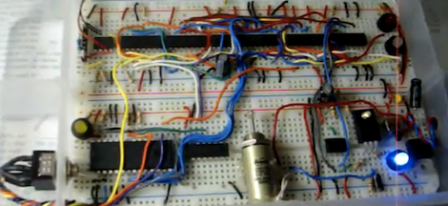
[Eric] needed a project for his digital logic design class, and decided on a lock that open in response to a specific pattern of knocks. This is a fairly common project that we’ve seen a few builds with ‘knock locks,’ but this one doesn’t use a microcontroller. Instead, it uses individual logic chips.
The lock senses the knocks with a piezo, just like every other build we’ve seen. Unlike the other builds, the knock pattern is then digitized and stored in an EEPROM. [Eric] only used 12 chip for this build, a feat he could accomplish with a few digital tricks, like making an inverter by tying one XOR input high.
We’ve seen a 555-based knock lock before, but getting the timing right with that seems a little maddening. [Eric]’s build seems much more user-friendly, and has the added bonus of being programmed by knocking instead of turning potentiometers. Check out [Eric]’s knock lock after the break.
Edit: fixed the link.
[youtube=http://www.youtube.com/watch?v=fvPfXka4dDY&w=470]
















Please update your link to the project. The current link, she goes nowhere.
I know it’s a re-post, but I figure the more comments you get about it the more likely it will be fixed. Link is dead, I tried finding it using google and all of the ones I tried lead back to HaD.
here is the link until HaD fixes ther dead one…
Click me!
Thanks Mike.
You know the electronics hobby is well on its way out when “making an inverter by tying one XOR input high” is considered a neat “trick” instead of a tedious banality.
like
@Dmitry; relax man, the important evidence is showing us that hobby electronics is not on the way out. Regardless of experience, I’m pretty sure there isn’t anyone engaged in hobbyist electronics who knows it all to be able to spare you tedium. Frankly your criticism is one of the banal comments we see too often. A thank you to Eric for publishing his project to the web.
Just use a microcontroller (pic/atmel/arduino) and save time and money and carbon footprint.
Here’s an suggestion for you:
Just stop browsing the web and stop posting comments online. It will save time and money and carbon footprint.
Pot. Kettle. Take your blood pressure pills.
I am much more impressed seeing this done with TTL parts. Combo locks, clocks, calculators are much more interesting to me implemented with a bunch of discrete IC’s and components rather than done all in software with a uController. uControllers are certainly more efficient/cheaper but nothing beats a comparable circuit done completely with logic chips.
I really like this design, just wish my 555 design worked just as well. Congratulations to Eric.
Logic chips are a fun way to learn digital electronics as they are easy to understand. The design is very well made, i specially like its ability to learn the pattern.
@those arguing about micros, do note that it is a “final project for digital logic design”
I do agree. As much as I like software, doing things in hardware can be so much more satisfying from a design standpoint. Sure, this would be trivial if done in software, but that take all the fun out of it; the non-trivial part was done for you in designing the controller. I just finished up a third-year Digital Systems Design course in which we had the relative luxury of using FPGAs. We ended up creating a simplistic platformer “game” in hardware. Could we have done it much more easily with a CPU and some code? Sure, but that would have been boring, and wouldn’t have taught us nearly as much (about anything, really).